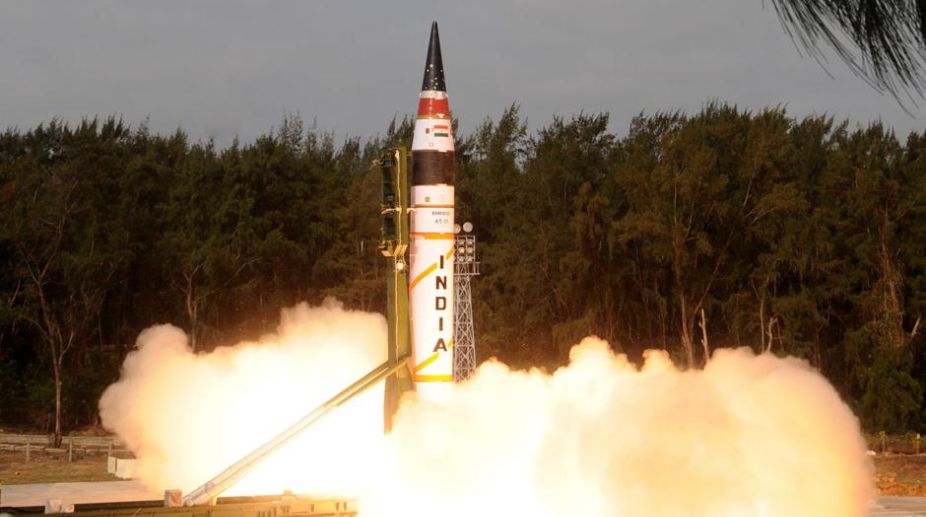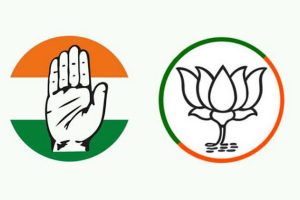New Delhi’s rejection of the uncalled for advice from Beijing about the inviolability of international obligations in the aftermath of India’s testing of the Agni V missile is yet another example of the stiffening of India’s attitude towards China.
There was no need for Beijing to express the hope that India would abide by UN Security Council rules on missiles and safeguard South Asia’s strategic balance. It is odd for China, which is flouting an international tribunal’s directive on South China Sea, to offer gratuitous sermons on rules and regulations. India has reminded its pesky neighbour, therefore, that it complies with all “applicable international obligations” and hopes that the others will do the same. The dig at China is obvious.
What has apparently bothered the latter is not only that the nuclear-capable Agni 5 can target the whole of China, but also that India’s military prowess is now reaching proportions which are a far cry from what they were in 1962 when China decided to teach India a lesson, as Deng Xiaoping said.
True, China is still well ahead of India as a military power. But it has realised that India is no longer a pushover. For Beijing, therefore, the presence of a fairly strong military power in what it considers its backyard is bound to puncture its Middle Kingdom pretensions.
Up until now, China has been dismissive about the objections to its expansionist designs by East Asian countries like Japan or the Philippines or even Vietnam even if China found Vietnam to be a formidable adversary when it also tried to teach it a lesson in 1979.
But, now, with India acquiring an impressive nuclear arsenal and also developing a mentality which shuns excessive prudence as before, China has no option but to act with greater restraint, especially when India’s relations with Japan and Vietnam have become all the more cordial because of the realisation on their parts of the need to put up a united front vis-a-vis China.
Although India has said that its intercontinental missiles are not directed at any country, it is no secret that only China at present answers to the description of being unfriendly and even hostile.
So does Pakistan, which is why it is China’s all-weather friend and a useful ally in the event of a confrontation with India. China and Pakistan are the only two countries with which India has gone to war since attaining independence.
But war is nowadays avoided by most countries because the emphasis in international relations is shifting to trade and commerce for the sake of boosting economic growth.
Not surprisingly, China has stressed the importance of maintaining strategic balance and stability in South Asia in the context of Agni V and also spoken of itself as India’s partner and not a rival.
The emphasis on stability underlines China’s realisation that for all the clandestine military assistance that it gives to Pakistan, the latter will never be able to match India’s strategic strength either in the economic or the military field.
China is also aware that only stability in the region can ensure the success of the economic corridor that it is building through Pakistan, including Pakistan-occupied Kashmir. It also passes through Baloochistan, which is why China has been concerned about India’s support for the anti-Pakistan Balooch rebels. Any sign of destabilisation caused by the upsurge of Balooch militancy or unease in Pakistan about India’s military capabilities cannot be conducive to the flourishing of economic activity which the corridor promises.
The aid and abetment of terrorism by Pakistan is another unsettling factor. It remains to be seen whether India’s growing military prowess persuades China to advise Pakistan against persisting with its proxy war against India, especially when the surgical strikes by the Indian army last September showed that New Delhi’s patience is not limitless.
Since Agni V will be followed by Agni VI, which will have multiple warheads, it is clear that a new strategic scenario is evolving in South and East Asia. As a “major defence partner” of the US, India has acquired a position which cannot but cause considerable unease in China.
For the first time, there is now some kind of a balance in Sino-Indian relations where no one can claim to be unquestionably the foremost power. Therefore, it is not goodwill alone which has made China express the hope that it looks for better relations with India in 2017 since the “main theme of China-India relations remains friendship and cooperation”, as a Chinese foreign ministry spokesperson has said.
China has also invited India to join the proposed alliance of countries ranging from Pakistan to Iran and Russia which Islamabad is trying to set up as a kind of a larger SAARC after the failure of the SAARC summit in Islamabad last September because of India’s refusal to participate in protest against the Pakistani instigation of terror in India.
At the same time, the decision by China, Russia and Pakistan to exclude a selected few Taliban militants in Afghanistan from UN sanctions shows that the Great Game of trying to outwit one another is not over.












